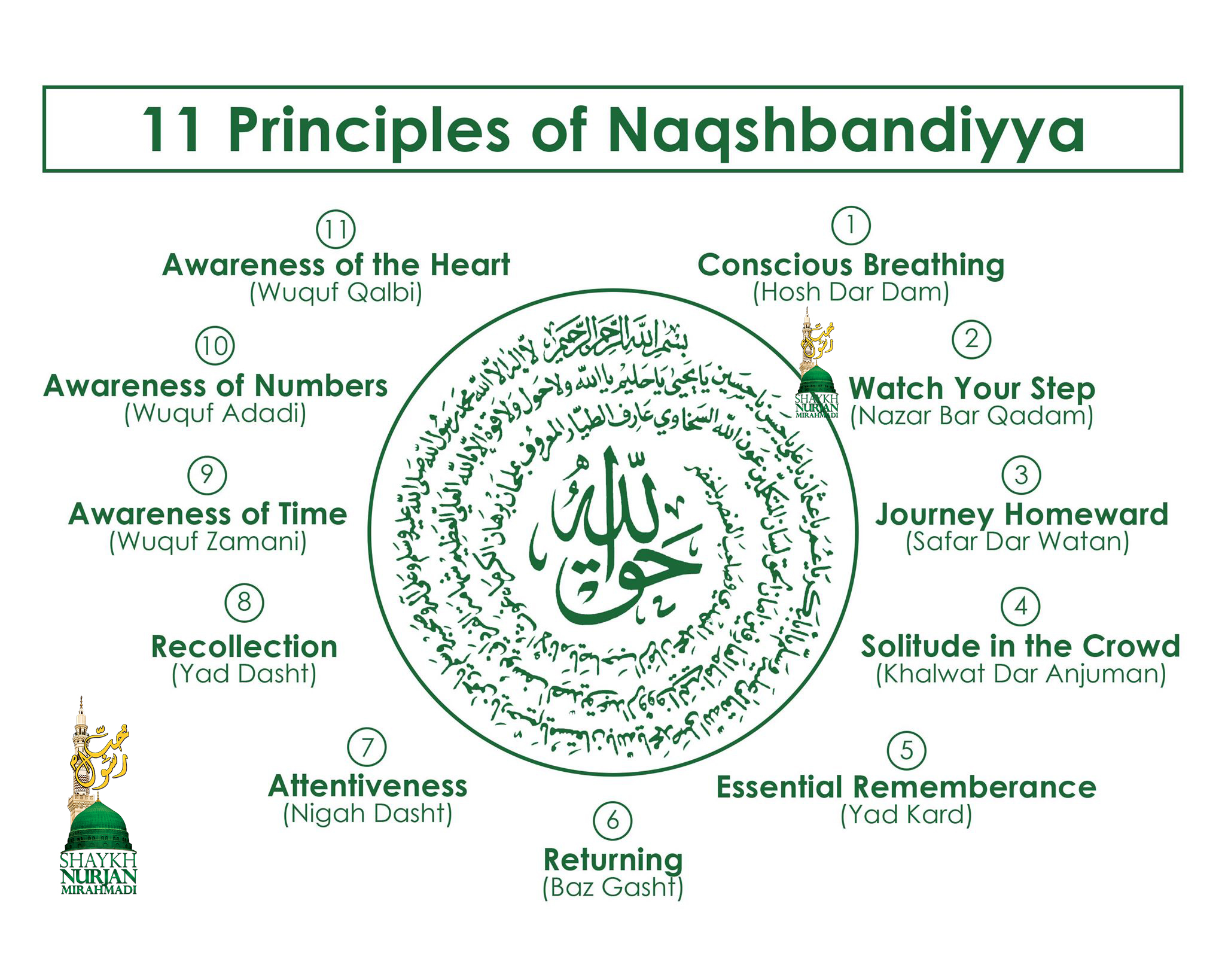
11 Principles of the Naqshbandiyatul Aliya Sufi Order
From the Realities of Shah Bahauddin Muhammad Owaisi Al Bukhari an Naqshbandi.
A’uzu Billahi Minash Shaitanir Rajeem, Bismillahir Rahmanir Raheem
I seek refuge in Allah from Satan, the rejected one
In the Name of Allah, the Most Beneficent, the Most Merciful
Shaykh Abdul Khaliq al Ghujdawani [11th Shaykh of the Naqshbandi Golden Chain] coined the following phrases which are now considered the principles of the Naqshbandi Tariqa (Spiritual Order):
- Hosh dar Dam (Conscious Breathing)
- Nazar bar Qadam (Watch Your Footstep)
- Safar dar Watan (Journey to Homeland)
- Khalwat dar Anjuman (Solitude in the Crowd)
- Yad kard (Essential Remembrance)
- Baz gasht (Returning back)
- Nigah dasht (Attentiveness)
- Yad dasht (Recollection)
- Wuquf Zamani (Vigilance/Awareness of Time)
- Wuquf ‘Adadi (Vigilance/Awareness of Numbers)
- Wuquf Qalbi (Vigilance of the Heart)
11 Principles as it Relates to Body, Mind, Soul
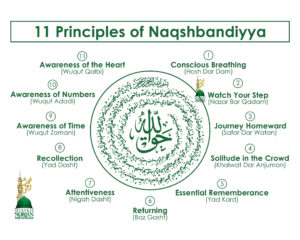
Body Meditation – Step 1 – 4
1. Conscious Breathing “Hosh dar dam” –
 Hosh means mind, ‘dar’ means in, ‘dam’ means breath. It means, according to Abdul Khaliq al Ghujdawani (Q), that
Hosh means mind, ‘dar’ means in, ‘dam’ means breath. It means, according to Abdul Khaliq al Ghujdawani (Q), that
“The wise seeker must safeguard his breath from heedlessness, coming in and going out, thereby keeping his heart always in the Divine Presence. And he must revive his breath with worship and servitude and dispatch this worship to His Lord full of life. For every breath which is inhaled and exhaled with Presence is alive and connected with the Divine Presence. Every breath inhaled and exhaled with heedlessness is dead, disconnected from the Divine Presence.”
 Shaykh Ubaidullah al Ahrar (q) [20th Shaykh of Naqshbandi Gold Chain] said,
Shaykh Ubaidullah al Ahrar (q) [20th Shaykh of Naqshbandi Gold Chain] said,
“The most important mission for the seeker in this Order is to safeguard his breath, and he who cannot safeguard his breath, it would be said of him, ‘he lost himself.'”
Shah Bahauddin Naqshband (q) [17th Shaykh of Naqshbandi Golden Chain, that the tariqa is named after] said, “This Order is built on breath. So it is a must for everyone to safeguard his breath in the time of his inhalation and exhalation and further, to safeguard his breath in the interval between the inhalation and exhalation.”
[Reality of Ha in the Huroof of Ism Allah]
Shaikh Abul Janab Najmuddin al-Kubra said in his book, Fawatih al-Jamal,
“Dhikr is flowing in the body of every single living creatures by the necessity of their breath – even without will – as a sign of obedience, which is part of their creation. Through their breathing, the sound of the letter “Ha” of the Divine Name Allah is made with every exhalation and inhalation and it is a sign of the Unseen Essence serving to emphasize the Uniqueness of God. Therefore it is necessary to be present with that breathing, in order to realize the Essence of the Creator.”
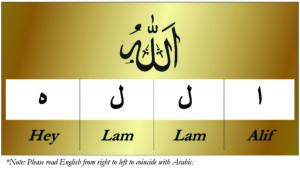 The name ‘Allah الله‘ which encompasses the ninety-nine Names and Attributes consists of four letters, Alif, Laam, Laam, and the same Hah (ALLAH). The people of Sufism say that the absolute unseen Essence of Allah Exalted and Almighty is expressed by the last letter vowelized by the Alif, “Ha.” It represents the Absolutely Unseen “He-ness” of the Exalted God (Ghayb al-Huwiyya al-Mutlaqa lillah ‘azza wa jall). The first Lam is for the sake of identification (ta’rif) and the second Lam is for the sake of emphasis (mubalagha).
The name ‘Allah الله‘ which encompasses the ninety-nine Names and Attributes consists of four letters, Alif, Laam, Laam, and the same Hah (ALLAH). The people of Sufism say that the absolute unseen Essence of Allah Exalted and Almighty is expressed by the last letter vowelized by the Alif, “Ha.” It represents the Absolutely Unseen “He-ness” of the Exalted God (Ghayb al-Huwiyya al-Mutlaqa lillah ‘azza wa jall). The first Lam is for the sake of identification (ta’rif) and the second Lam is for the sake of emphasis (mubalagha).
Safeguarding your breath from heedlessness will lead you to complete Presence, and complete Presence will lead you to complete Vision, and complete Vision will lead you to complete Manifestation of Allah’s Ninety-Nine Names and Attributes. Allah leads you to the Manifestation of His Ninety-Nine Names and Attributes and all His other Attributes, because it is said, “Allah’s Attributes are as numerous as the breaths of human beings.”
[Safeguarding Breath -> Complete Presence -> Complete Vision ->Manifestation of Allah’s 99+ Names and Attributes]
It must be known by everyone that securing the breath from heedlessness is difficult for seekers. Therefore they must safeguard it by seeking forgiveness (istighfar) because seeking forgiveness will purify it and sanctify it and prepare the seeker for the Real Manifestation of Allah everywhere.
2. Watch Your Step “Nazar bar qadam”
It means that the seeker while walking must keep his eyes on his feet. Wherever he is about to place his feet, his eyes must be there. He is not allowed to send cast his glance here or there, to look right or left or in front of him, because unnecessary sights will veil the heart. Most veils on the heart are created by the pictures which are transmitted from your eyes to your mind during your daily living. These may disturb your heart with turbulence because of the different kinds of desire which have been imprinted on your mind. These images are like veils on the heart. They block the Light of the Divine Presence. This is why Sufi saints don’t allow their followers, who have purified their hearts through constant Dhikr, to look at other than their feet. Their hearts are like mirrors, reflecting and receiving every image easily. This might distract them and bring impurities to their hearts. So the seeker is ordered to lower his gaze in order not to be assailed by the arrows of devils.
 Lowering the gaze is also a sign of humility; proud and arrogant people never look at their feet. It is also an indication that one is following the footsteps of the Prophet [Muhammad ﷺ], who when he walked never used to look right or left, but used to look only at his feet, moving steadfastly towards his destination. It is also the sign of a high state when the seeker looks nowhere except towards his Lord. Like one who intends to reach a destination quickly, so too the seeker of Allah’s Divine Presence is moving quickly, not looking to his right or his left, not looking at the desires of this world, but looking only for the Divine Presence.
Lowering the gaze is also a sign of humility; proud and arrogant people never look at their feet. It is also an indication that one is following the footsteps of the Prophet [Muhammad ﷺ], who when he walked never used to look right or left, but used to look only at his feet, moving steadfastly towards his destination. It is also the sign of a high state when the seeker looks nowhere except towards his Lord. Like one who intends to reach a destination quickly, so too the seeker of Allah’s Divine Presence is moving quickly, not looking to his right or his left, not looking at the desires of this world, but looking only for the Divine Presence.
Imam ar-Rabbani Ahmad al-Faruqi (q) said in the 295th letter of his Maktubat:
“The gaze precedes the step and the step follows the gaze. The Ascension to the high state is first by the Vision, followed by the Step. When the Step reaches the level of the Ascension of the Gaze, then the Gaze will be lifted up to another state, to which the Step follows in its turn. Then the Gaze will be lifted even higher and the Step will follow in its turn. And so on until the Gaze reaches a state of Perfection to which it will pull the Step. We say, ‘When the Step follows the Gaze, the murid has reached the state of Readiness in approaching the Footsteps of the Prophet, peace be upon him. So the Footsteps of the Prophet [saws] are considered the Origin of all steps.'”
Shah Naqshband (q) said, “If we look at the mistakes of our friends, we will be left friendless, because no one is perfect.”
{Qadam Or Footsteps signifies Will, Trying to Match our Will with the Will of our Shaykh , Then Prophet (saws) Then our Lord. Ati Allah wa Ati Rasul wa Ulul amr minkum (Holy Quran 4:59.}
أَطِيعُواللَّه وَأَطِيعُوٱلرَّسُولَ وَأُوْلِي الْأَمْرِ مِنْكُمْ…
4:59 – “…Atiu Allaha wa atiur Rasola wa Ulil amre minkum…“ (Surat an-Nisa)
“… Obey Allah, obey the Messenger, and those in authority among you. ” (The Women, 4:59)
3. Journey to Homeland “Safar dar Watan”
It means to travel to one’s homeland. It means that the seeker travels from the world of creation to the world of the Creator. It is related that the Prophet (saws) said, “I am going to my Lord from one state to a better state and from one station to a higher station.” It is said that the seeker must travel from the Desire for the forbidden to the Desire for the Divine Presence.
The Naqshbandi Order divides that travel into two categories. The first is external journeying and the second is internal journeying.
1. External Journey is to travel from one land to another searching for a perfect guide to take and direct you to your destination.
This enables you to move to the second category, the internal journey. Seekers, once they have found a perfect guide, are forbidden to go on another external journey. In the external journey there are many difficulties which beginners cannot endure without falling into forbidden actions, because they are weak in their worship.
2. The second category is internal journeying.
- Internal journeying requires the seeker to leave his low manners and move to high manners, to throw out of his heart all worldly desires.
- He will be lifted from a state of uncleanness to a state of purity. At that time he will no longer be in need of more internal journeying.
- He will have purified his heart, making it pure like water, transparent like crystal, polished like a mirror, showing the realities of all matters essential for his daily life, without any need for external action on his part. In his heart will appear everything that is needed for his life and for the life of those around him.
4. Solitude in the Crowd “Khalwat dar Anjuman” – Body Meditation
“Khalwat” means seclusion. It means to be outwardly with people while remaining inwardly with God. There are also two categories of seclusion. The first is external seclusion and the second is internal seclusion.
1. External seclusion requires the seeker to seclude himself in a private place that is empty of people. Staying there by himself, he concentrates and meditates on Dhikrullah, the remembrance of God, in order to reach a state in which the Heavenly Realm becomes manifest. When you chain the external senses, your internal senses will be free to reach the Heavenly Realm. This will bring you to the second category: the internal seclusion.
2. The internal seclusion means seclusion among people. Therein the heart of the seeker must be present with his Lord and absent from the Creations while remaining physically present among them.
- It is said, “The seeker will be so deeply involved in the silent Dhikr [Divine remembrance] in his heart that, even if he enters a crowd of people, he will not hear their voices.
- The state of Dhikr overcomes him. The manifestation of the Divine Presence is pulling him and making him unaware of all but his Lord.
This is the highest state of seclusion, and is considered the true seclusion, as mentioned in the Holy Qur’an: “Men whom neither business nor profit distract from the recollection of God” [24:37]. This is the way of the Naqshbandi Order.
رِجَالٌ لَّا تُلْهِيهِمْ تِجَارَةٌ وَلَا بَيْعٌ عَن ذِكْرِ اللَّـهِ وَإِقَامِ الصَّلَاةِ وَإِيتَاءِ الزَّكَاةِ ۙ يَخَافُونَ يَوْمًا تَتَقَلَّبُ فِيهِ الْقُلُوبُ وَالْأَبْصَارُ ﴿٣٧
24:37 – “Rijalun la tulheehim tijaratun wa la bay’un ‘an Dhikrillahi wa iqamis Salati wa eetayiz Zakati, yakhafona yawman tataqallabu feehi alqulobu wal absar.” (Surat an Nur)
“By men of God (Rijal) whom neither business/commerce nor sale distracts (them) from the remembrance of Allah and performance of prayer and giving of regular Charity. Their (only) fear is for a Day in which the hearts and eyes will be transformed/turn about (in a world wholly new).” (The Light)
The primary seclusion of the shaykhs of the Naqshbandi Order is the internal seclusion.
- They are with their Lord and simultaneously they are with the people.
- As the Prophet ﷺ said, “I have two sides: one faces my Creator and one faces creation.”
- Shah Naqshband emphasized the goodness of gatherings when he said: Tariqatuna as-suhbat wal khairu fil jam’iyat (“Our Way is Companionship, and Goodness is in the Gathering/[association]”).
It is said that the believer who can mingle with people and carry their difficulties, is better than the believer who keeps away from people. On that delicate point Imam Rabbani said,
“It must be known that the seeker at the beginning might use the external seclusion to isolate himself from people, worshiping and concentrating on Allah, Almighty and Exalted, until he reaches a higher state.
At that time he will be advised by his shaikh, in the words of Sayyid al-Kharraz, ‘Perfection is not in exhibitions of miraculous powers, but perfection is to sit among people, sell and buy, marry and have children; and yet never leave the presence of Allah even for one moment.'”
Mind Meditation: Step 5 & 6
5. Essential Remembrance “Yad kard”
The meaning of ‘Yad’ is Dhikr [Remembrance]. The meaning of ‘kard‘ is the essence of Dhikr.
 That state will be achieved by reciting every day the negation (LA ILAHA لا اله ) and affirmation (IL ALLAH الا الله ) on the tongue, between 5,000 and 10,000 times, removing from his heart the elements that tarnish and rust it.
That state will be achieved by reciting every day the negation (LA ILAHA لا اله ) and affirmation (IL ALLAH الا الله ) on the tongue, between 5,000 and 10,000 times, removing from his heart the elements that tarnish and rust it.- This dhikr polishes the heart and takes the seeker into the state of Manifestation.
- He must keep that daily dhikr, either by heart or by tongue, repeating ALLAH, the name of God’s Essence which encompasses all other names and Attributes, or by negation and affirmation through the saying of LA ILAHA ILLALLAH.
This daily dhikr will bring the seeker into the perfect presence of the One Who is glorified.
[The Dhikr of La ilaha, IlAllah – Negation of the Mind]
 The Dhikr by negation and affirmation, in the manner of the Naqshbandi Sufi Masters, demands that the seeker,
The Dhikr by negation and affirmation, in the manner of the Naqshbandi Sufi Masters, demands that the seeker,
- Close his eyes,
- Close his mouth,
- Clench his teeth,
- Glue his tongue to the roof of his mouth,
- and hold his breath.
- He must recite the dhikr through the heart, by negation and affirmation, beginning with the word LA لا (“No”). He lifts this “No” from under his navel up to his brain.

- Upon reaching his brain the word “No” brings out the word ILAHA اله (“god”), moves from the brain to the Right shoulder,
- and hits the heart with ILLALLAH الا الله (“except The God”).
- When that word hits the heart its energy and heat spreads to all the parts of the body. The seeker who has denied all that exists in this world with the words LA ILAHA لا اله, affirms with the words IL ALLAH الا الله that all that exists has been annihilated in the Divine Presence.
The seeker repeats this with every breath, inhaling and exhaling, always making it come to the heart, according to the number of times prescribed to him by his Shaikh.
 The seeker will eventually reach the state where in one breath he can repeat LA ILAHA ILLALLAH twenty-three times.
The seeker will eventually reach the state where in one breath he can repeat LA ILAHA ILLALLAH twenty-three times.- A perfect Shaikh can repeat LA ILAHA ILLALLAH an infinite number of times in every breath.
- The meaning of this practice is that the only goal is ALLAH and that there is no other goal for us.
- To look at the Divine Presence as the Only Existence after all this throws back into the heart of the murid the love of the Prophet ﷺ and at that time he says, MUHAMMADUN RASULULLAH (“Muhammad ﷺ is the Prophet of God”) which is the heart of the Divine Presence.
6. Returning Back “Bazgasht”
This is a state in which the seeker, who makes Dhikr by negation and affirmation, comes to understand the Holy Prophet’s phrase,
اِلَهِى اَنْتَ مَقْصُوْدِيْ وَرِضَاكَ مَطْلُوْبِيْ
“ilahi anta maqsudi wa radhaaka matloob–
“My God, You are my aim, and Your good pleasure/satisfaction is what I seek.”
- The recitation of this phrase will increase in the seeker the awareness of the Oneness of God, until he reaches the state in which the existence of all creation vanishes from his eyes.
- All that he sees, wherever he looks, is the Absolute One. {Every thing in the Bahr Qudra [Ocean of Power]}
- The Naqshbandi murids [followers] recite this sort of dhikr in order to extract from their hearts the secret of Oneness, and to open themselves to the Reality of the Unique Divine Presence.
- The beginner has no right to leave this dhikr if he doesn’t find its power appearing in his heart. He must keep on reciting it in imitation of his Shaykh, because the Prophet has said,
“Whoever imitates a group of people will belong to them.” And whoever imitates his teacher will some day find this secret opened to his heart.
The meaning of the phrase “baz gasht” is the return to Allah Exalted and Almighty by showing  complete surrender and submission to His Will, and complete humbleness in giving Him all due praise. That is the reason the Holy Prophet ﷺ mentioned in his invocation,[hds]
complete surrender and submission to His Will, and complete humbleness in giving Him all due praise. That is the reason the Holy Prophet ﷺ mentioned in his invocation,[hds]
“ma dhakarnaka haqqa dhikrika ya Madhkur”
“We did not Remember You as You Deserve to be Remembered, O Allah”) [Prophet Muhammad ﷺ].
The seeker cannot come to the presence of Allah in his dhikr, and cannot manifest the Secrets and Attributes of Allah in his dhikr, if he does not make dhikr with Allah’s Support and with Allah’s Remembrance of him.
As Bayazid [6th Shaykh of the Naqshbandi Golden Chain] said: “When I reached Him I saw that His remembering of me preceded my remembrance of Him.”
The seeker cannot make dhikr by himself. He must recognize that Allah is the one making Dhikr through him.
Soul Meditation: Step 7 – 11
7. Attentiveness “Nigah dasht”
“Nigah” means sight. It means that the seeker must watch his heart and safeguard it by preventing bad thoughts from entering.
- Bad inclinations keep the heart from joining with the Divine. It is acknowledged in the
 Naqshbandiya that for a seeker to safeguard his heart from bad inclinations for fifteen minutes is a great achievement. For this he would be considered a real Sufi.
Naqshbandiya that for a seeker to safeguard his heart from bad inclinations for fifteen minutes is a great achievement. For this he would be considered a real Sufi.
Sufism is the power to safeguard the heart from bad thoughts and protect it from low inclinations. Whoever accomplishes these two goals will know his heart, and whoever knows his heart will know his Lord. The Holy Prophet has said, “Whoever knows himself knows His Lord.”
قَال رَسُولَ اللَّهِ ﷺ:” مَنْ عَرَفَ نَفْسَهْ فَقَدْ عَرَفَ رَبَّهُ”
Qala Rasulullahi ﷺ: “Man ‘arafa nafsahu faqad ‘arafa Rabbahu”
The Messenger of Allah (pbuh) said: “Who knows himself, knows his Lord.”
One Sufi Shaikh said, “Because I safeguarded my heart for ten nights, my heart has safeguarded me for twenty years.”
Abu Bakr al-Qaittani said, “I was the guard at the door of my heart for 40 years, and I never opened it for anyone except Allah, Almighty and Exalted, until my heart did not know anyone except Allah Almighty and Exalted.”
Abul Hassan al-Kharqani [7th Shaykh of the Naqshbandi Golden Chain] said,
“It has been 40 years that Allah has been looking at my heart and has seen no one except Himself. And there is no room in my heart for other than Allah.”
8. Recollection “Yad dasht”
It means that the reciter of Dhikr safeguards his heart with negation and affirmation in every breath without leaving the Presence of Allah Almighty and Exalted.
- It requires the seeker to keep his heart in Allah’s Divine Presence continuously.
- This allows him to realize and manifest the Light of the Unique Essence (anwar adh-dhat al-Ahadiyya) of God.
- He then casts away three of the four different forms of thoughts:
- the egoistic thoughts,
- the evil thoughts, and
- the angelic thoughts,
- keeping and affirming solely the fourth form of thought, the haqqani or truthful thoughts.
- This will lead the seeker to the highest state of perfection by discarding all his imaginings and embracing only the Reality which is the Oneness of Allah, Almighty and Exalted.
9. Vigilance/Awareness of Time “Wuquf Zamani“
It means to watch one’s composure and check one’s tendency to heedlessness.
- The seeker must know how much time he has spent in moving towards spiritual maturity and must recognize at what place he has arrived in his journey towards the Divine Presence.
- The seeker must make progress with all his efforts.
- He must spend all his time making his one and only goal the arrival at the station of Divine love and Divine Presence.
- He must become aware that in all his efforts and in all his actions Allah witnesses the smallest detail.
The seeker must make an account of his actions and his intentions every day and every night and analyze his actions each hour, each second, and each moment.
- If they are good, he thanks God for it. If they are bad, he must repent and ask Allah’s forgiveness.
Ya’qub al-Charki [19th Shaykh of the Naqshbandi Golden Chain] said that his shaykh, Ala’uddin al-Attar [20th Shaykh of the Naqshbandi Golden Chain] said,
“In the state of depression you must recite istighfar (asking forgiveness) excessively, and in the state of elation, praise of Allah excessively.” And he said, “To take into consideration these two states, contraction and expansion, is the meaning of wuquf zamani.” [Ala’uddin al-Attar]
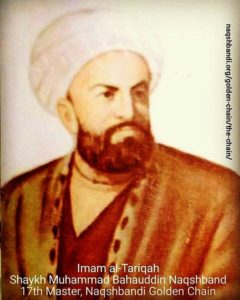 Shah Naqshband (q) explained that state by saying, “You have to be aware of yourself. If you were following the shari’a then you have to thank Allah, or else you must ask forgiveness.”
Shah Naqshband (q) explained that state by saying, “You have to be aware of yourself. If you were following the shari’a then you have to thank Allah, or else you must ask forgiveness.”
What is important for the seeker in this state is to keep secure the smallest period of time. He has to stand guard on his self and judge if he was in the Presence of Allah or if he was in the presence of his ego, at every moment of his life.
Shah Naqshband (q) said, “You have to evaluate how you spend every moment: with Presence or in Negligence.”
10. Vigilance/Awareness of Numbers “Wuquf ‘Adadi”
This means that the seeker who is reciting dhikr must observe the exact number of repetitions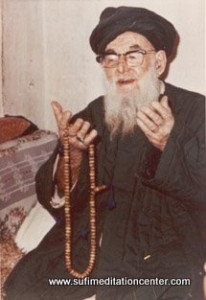 entailing the silent dhikr of the heart.
entailing the silent dhikr of the heart.
To keep an account of the dhikr is not for the sake of the account itself, but is for the sake of securing the heart from bad thoughts and to cause it to concentrate more in the effort to achieve the repetition prescribed by the Shaikh as quickly as possible.
The pillar of dhikr through counting is to bring the heart into the presence of the One who is mentioned in that dhikr and to keep counting, one by one, in order to bring one’s attention to the realization that everyone is in need of that One whose Signs are appearing in every creation.
Shah Naqshband (q) said, “Observance of the numbers in dhikr is the first step in the state of acquiring Heavenly Knowledge (ilm ul-ladunni).”
This means that counting leads one to recognize that only One is necessary for life. All mathematical equations are in need of the number One. All creation is in need of the only One.
11. Vigilance of the Heart “Wuquf Qalbi“
This means to direct the heart of the seeker towards the Divine Presence, where he will not see other  than his Beloved One. It means to experience His Manifestation in all states. Ubaidullah al-Ahrar said, “The state of Awareness of the Heart is the state of being present in the Divine Presence in such a way that you cannot look to anyone other than Him.”
than his Beloved One. It means to experience His Manifestation in all states. Ubaidullah al-Ahrar said, “The state of Awareness of the Heart is the state of being present in the Divine Presence in such a way that you cannot look to anyone other than Him.”
- In such a state one concentrates the place of Dhikr inside the heart because this is the center of power.
- All thoughts and inspirations, good and bad, are felt and appear one after another, circling and alternating, moving between light and dark, in constant revolution, inside the heart.
Dhikr [Divine Remembrance] is required in order to control and reduce that turbulence of the heart.
Date of last update: July 11, 2021
Related Articles:
- The Healing Power of Islamic Prophetic Muraqabah (Meditation) – Main Page, Step by step Tafakkur, Meditation, Energy Practices, Angelic realities
- Vigilance of the Heart – Heart is the Sun – Hajj of Heart, Power of the Breath
Please Donate and support us by clicking in the heart button below to spread these heavenly knowledges.
Copyright © 2016 Naqshbandi Islamic Center of Vancouver, All Rights Reserved.













![[ID: RZyVMKyi974] Youtube Automatic](https://nurmuhammad.com/wp-content/uploads/id-rzyvmkyi974-youtube-automatic-236x133.jpg)
![[ID: gzWSkfAfMj4] Youtube Automatic](https://nurmuhammad.com/wp-content/uploads/id-gzwskfafmj4-youtube-automatic-236x133.jpg)